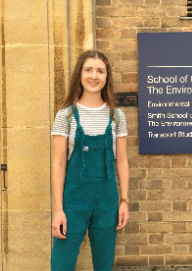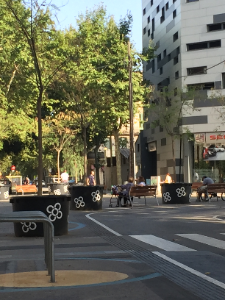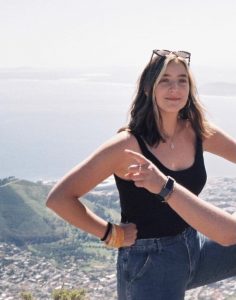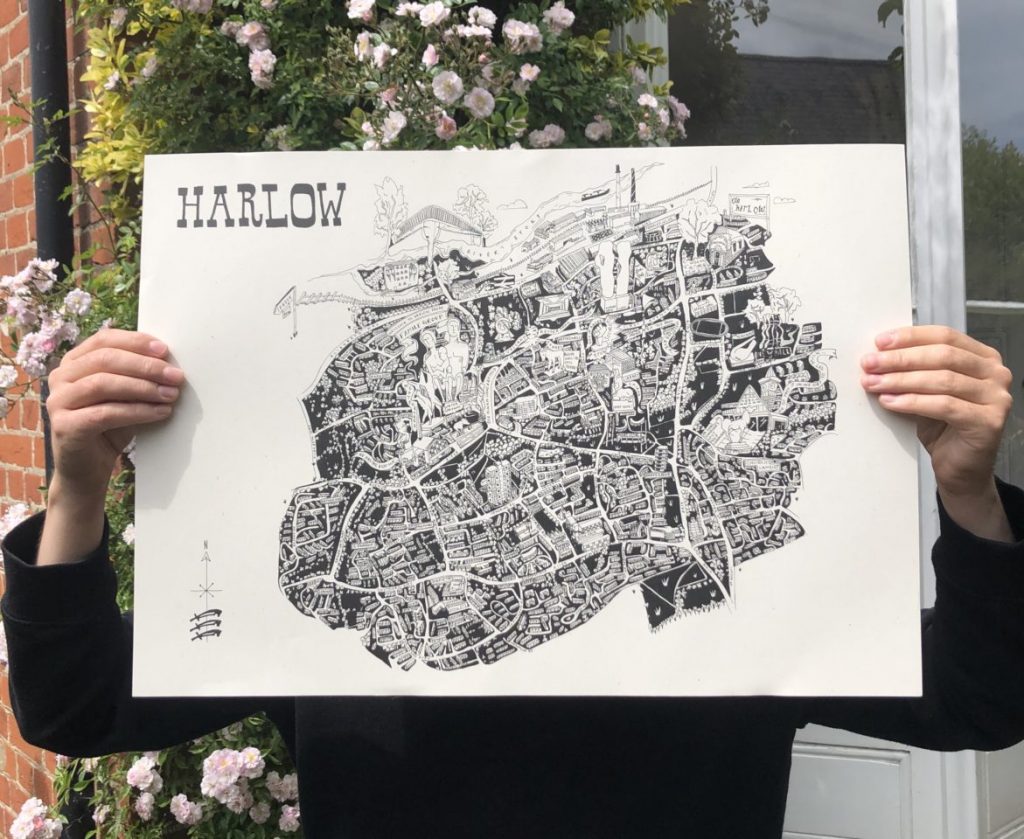
Eleanor Pendle (winner), University of Oxford
Dissertation entitled: ‘The Poblenou Superblock: Rights, Responsibilities and Exclusions‘
What inspired you to study Geography?
I wanted to study Geography at University to have the opportunity to delve deeper into this diverse, interdisciplinary subject; I was especially drawn to the emphasis placed on the complex interconnections between the human and more-than-human world. I crucially believed (and still believe!) that Geography provides the most useful, interesting, and productive lenses through which to better understand and critically analyse societies and environments.
Your dissertation focuses on rights to the city and urban citizenship in a Barcelona ‘superblock’. What is a ‘superblock’ and what led you to study these issues around it for your project?
A superblock is an urban planning intervention being developed by a public consortium – BCNecologia – that aims to prioritise the needs of people over cars in contemporary cities. I first came across this initiative in an A Level Geography class where we were discussing novel ways in which cities are becoming more sustainable. Since I wanted to incorporate my Spanish into the dissertation process and had been fascinated by the project, I decided it would provide an ideal research context.

Your dissertation was based on rich ethnographic fieldwork undertaken in just 2 weeks In Barcelona, and working across languages – could you tell us a bit about your experience of doing the research?
The most important thing is that I needed (and liked!) was to be very, very prepared – but also to make the most of unexpected aspects or opportunities as they arose in the field. At times, the thought of going to Barcelona to conduct interviews with people I had never met before was really daunting. But in the end, it was an incredibly exciting and enriching experience – perhaps the academic highlight of my degree. My time conducting research in Barcelona was absolutely unforgettable, especially since I met some incredibly kind, warm, insightful, and generous people; my research couldn’t exist without them.
What do you feel you learnt or gained from the dissertation process?
With the help of my supervisor, I grew to embrace the freedom to direct and develop my research in both more conceptually rooted and empirically significant ways. It was an amazing feeling to take an initial idea and run with it, from planning fieldwork logistics and reaching out to potential participants to conducting interviews, analysing transcripts, writing up findings, and re-drafting arguments over the course of a year.
Completing the dissertation also reaffirmed the importance of not letting self-doubt hold you back. I was unsure about the adequacy of my Spanish (from A Level) to conduct the interviews in the depth that I wanted and needed, but instinctively felt that I could do it since I had actively kept up the language since school. And after carrying out over 75 pre- and unarranged interviews in Spanish, I proved my point! It was amazing when interviewees complemented my Spanish and I was really proud of how rapidly I adapted to the context and become comfortable processing information and engaging with people in an open and professional way.
Do you have any advice for students currently thinking about studying Geography?
It can be helpful to check out the RGS-IBG Research Groups to see if the kinds of topics covered and research being conducted by members of the Groups interests you (since these are the kinds of academics who are likely to be lecturing and tutoring you at University). It’s really important to be proactive about your interests; try not to wait for a ‘light bulb’ moment but actively engage with the subject to see whether you want to pursue it further, remembering that it gets a lot more complex and multi-faceted – and interesting! – at University. Read a news article and think about how a Geographer might relate or respond to it, watch Geography talks and lectures on YouTube, find geographical podcasts, and look for suggested resources on University Geography Department websites. There’s so much out there once you start looking!

Bethan Jones (runner-up), University of Edinburgh
Dissertation entitled: ‘Walking Utopia: How is Harlow New Town remembered through public sculpture walks? A case for transcorporeal geographies of memory‘
What inspired you to study Geography?
During my time at school I struggled to find a subject which I loved. I think in part this is due to the limited nature of a-level curriculums, but also due to the fact that I hadn’t realised that I need not love one subject, but many. Choosing geography was a long process, but once I began looking into the modules offered within my degree – “writing landscapes”, “space, place and sensory perception” and “gender and environment” to name but a few – I knew geography was the one for me. Not because it had exactly what I was looking for, nor because it led into a decisive career path, but because it offered me time, intrigue I knew I would have the most fun studying geography, and I think that sums it up.
How did you come to choose public art and memory as the focus for your dissertation?
I grew up on the outskirts of Harlow New Town, Essex, and have fond memories of the sculptures which sporadically appear in the post-war landscape of modernist social housing estates, roundabouts and green space. In a way my dissertation focus was incredibly personal. My own experiences and memories prompted me to discover the ways public art, landscapes and mundane life intersect in Harlow to create a unique lived experience both in the past and how these experiences actively inform life today, and into the future as the artworks and the town respectively change with time. Geography and the arts is somewhat a vast and yet unfulfilled project. I think this lies in academic geography’s interest in the subconscious aspects of everyday life – the ways we live without realising, which has trouble embracing that public artworks are the antithesis. They are almost always intentional in form and function. It is this tension I found perplexing, and is what made me delve into Harlow New Town’s public artworks.
Your project takes a creative approach to the dissertation format, using narrative storying and illustrative map-making to present your findings – could you tell us a bit more about this approach, and your experiences of the walk-along interview method that formed the basis for your research?
The walk-along interviews are a technique which allowed participants to invite me into their hometown with control and connection to the surrounding landscapes. I was inspired by the political stance of feminist theorists such as Karen Barad and Stacy Alaimo, and wanted to incorporate a sense of radicalism to my method. It is only upon collecting my research did I see where this politics fitted in.
The participants during the walk-along method opened up more than I expected about their lives as they chose where we went and what they talked about. About grand schemes to sell a Barbra Hepworth sculpture to an American billionaire or the way the tactility of sculptures changed as time wore away at their surface. It is this relationship between place, agency and memories which allowed me to view space from a point of view which avoided casting landscapes as passive ‘backdrops’ to everyday life but instead how space and memory are entangled in environments where there is a syntax for reading space along a walk. The syntax I discovered during my research collection were the public artworks in Harlow. They worked as stepping stones linking memories between places and people. It was a pleasure to be able to explore the town countless times with residents, each exploring and using these stepping stones in a different order. In one sense my process was akin to reading the memories and landscapes in Harlow; public art as the language, and walking as the lines on a page connecting them together.
Because of this narrative ‘reading’ of space, I felt strongly my dissertation match my research style and take on a highly personal narrative format – four participants gaining their own chapters. The illustrated map was a means to undo the linearity of these antecedent narrative chapters. While storytelling works well in print, it fails to conjure up how complex and messy lived experience is in Harlow. The map is my attempt to record competing opinions of the sculptures and the town on one piece of paper, much inspired by Guy Debord’s deconstructions of seeing and being in urban space.

What do you feel you learnt or gained from the dissertation process?
My dissertation process was informed by the ways I thought I worked best. The emphasis here is on the fact I was unsure quite of what that meant, so I just gave myself time. I began my proposal in February 2019, then collected data in the summer. I found it highly useful to bite the bullet and collect data, as I wanted to avoid developing an argument before talking to participants. Around this time I knew I wanted to illustrate a map of the town by hand and was grateful for allowing myself room for adjust my timings. I began writing my dissertation and illustrating my map from October for an April deadline. Affording myself ample time to build relationships with participants, my supervisor and indeed get to know my material well was highly valuable. Above all, it is important to allow yourself time off, come back with fresh eyes and re-read and edit your work. Avoiding burnout, foregrounding commitment to your participants and rigour of research is a tricky balance, and I am still learning what that is, but staring your dissertation early is a good first step.
Do you have any advice for students currently thinking about studying Geography?
A piece of advice I have learned being a student is to research what your prospective lecturers study themselves. This is a great tip for finding out where geography can take you more widely, and the types of content you might expect from that lecturer’s courses. A good lecturer plays to their strengths and lectures around their own research perspectives, so make sure you choose a department you are interested in being a part of – it is a symbiotic relationship at degree level between teacher and student. Choosing geography is also a way to open countless doors to places, people and ideas. It sounds cliche, but geographers have a lot of fun together and it is an incredibly diverse and inclusive subject making it the perfect breeding ground for innovative research and exciting discoveries.
…and for Geography students who will soon be planning their dissertation research?
The dissertation is your opportunity to write the kind of work you wish you had read during your degree. It should be something which reflects your personality as much as your knowledge, if not more. Consequently, my advice is to be bold, committed and choose a topic which provokes a strong emotional response from yourself. And on a more practical note – keep a log of your sources as you go through the researching stages. You never know when you may need to retrace your steps to find a theory, quote or conceptual path to go down – It really is never too early to start a bibliography!